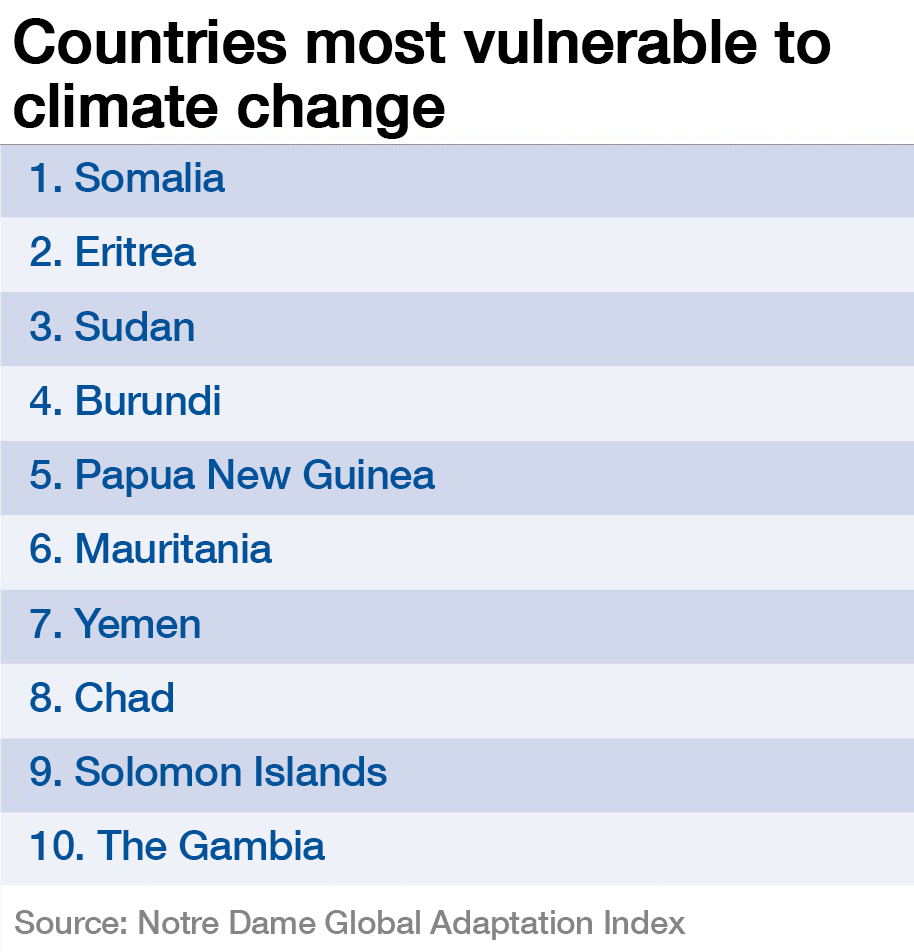Which countries are most vulnerable to climate change?
Stay up to date:
Future of the Environment
Somalia is the country most vulnerable to the impact of climate change, according to Notre Dame University’s Global Adaptation Index.
The index assesses 177 economies on how well they can adapt to climate change, including their readiness and vulnerability. The report measures vulnerability based on exposure, sensitivity and ability to react to climate change and has a number of sub-indicators measuring the vulnerability of food, water, health, ecosystems, human habitats and infrastructure.
The following table shows those nations most vulnerable, based on the 2014 Index.
So what is it that makes these countries so vulnerable?
- Somalia: Both food and water supplies are likely to be hit, with changing weather patterns causing drought and famine.
- Eritrea: Food supply problems, already common, are likely to be made worse.
- Sudan: Existing problems with access to clean and safe drinking will be made worse, with the related risk to human health.
- Burundi: Reliance on rice, wheat and maize means changing weather patterns are a threat to food supply.
- Papua New Guinea: Rising sea levels threatening food, water and infrastructure.
- Mauritania: Combination of drought and rising sea levels threatening aspects of food and water supply, as well as damaging infrastructure.
- Yemen: Worsening of existing water supply problems, and increasing levels of poverty.
- Chad: Both drought and flooding are likely to cause problems for farmers in the country.
- The Solomon Islands: Rising sea levels are already threatening the Islands’ entire existence.
- The Gambia: The agriculture sector could be hit hard by changing weather patterns.
To keep up with the Agenda subscribe to our weekly newsletter.
Author: Joe Myers is a Digital Content Producer at Formative Content.
Image: A man stands on cracked ground. REUTERS/Nacho Doce
Don't miss any update on this topic
Create a free account and access your personalized content collection with our latest publications and analyses.
License and Republishing
World Economic Forum articles may be republished in accordance with the Creative Commons Attribution-NonCommercial-NoDerivatives 4.0 International Public License, and in accordance with our Terms of Use.
The views expressed in this article are those of the author alone and not the World Economic Forum.
Related topics:
Forum Stories newsletter
Bringing you weekly curated insights and analysis on the global issues that matter.
More on Climate ActionSee all
Nigel Topping and Gonzalo Muñoz
May 28, 2025
Tom Crowfoot
May 27, 2025
Daniella Diaz Cely
May 27, 2025
Pascale Junker
May 26, 2025



